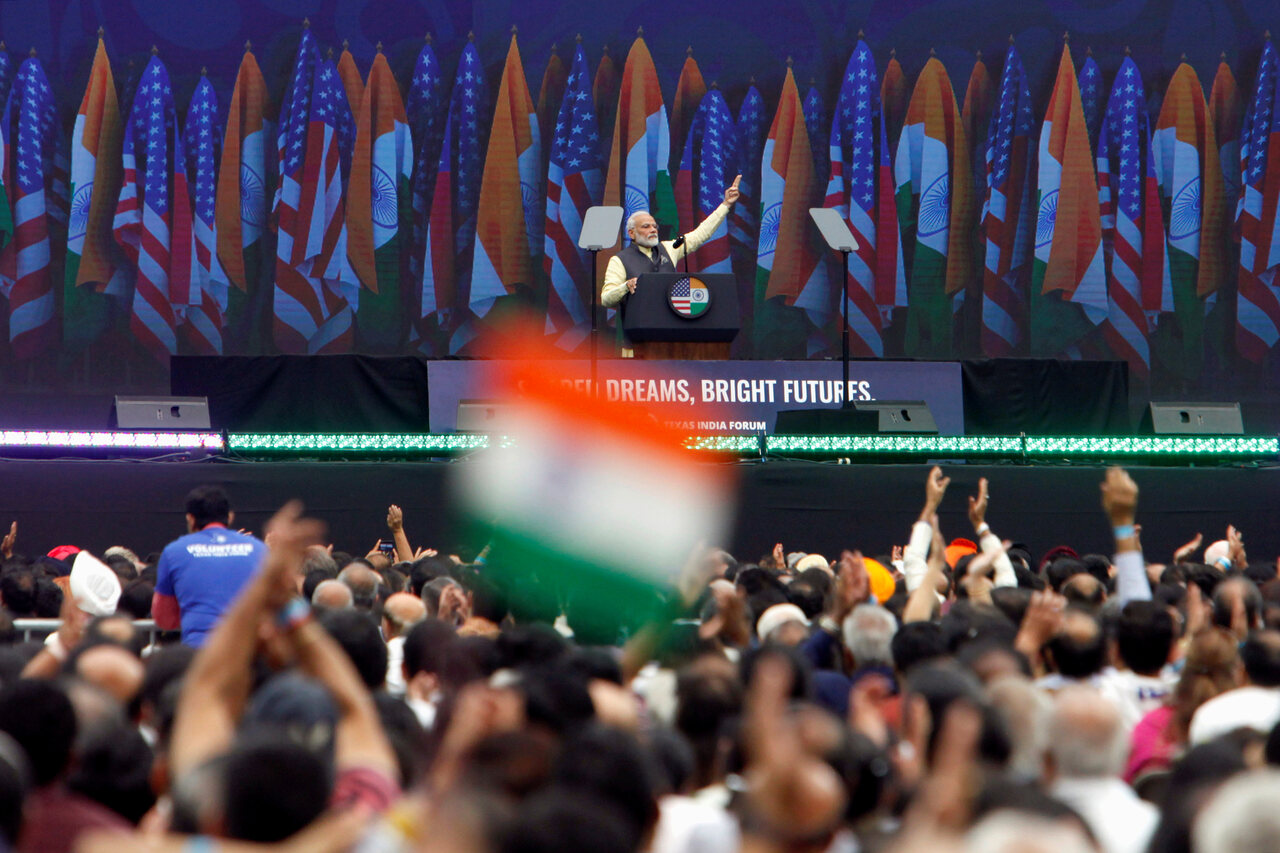Modi Heading for Third Term as Prime Minister
The clear favourite of the parliamentary elections in India, which will be held between 19 April and 1 June this year, is the Bharatiya Janata Party (BJP, Indian People’s Party), which has been in power since 2014. The economic growth of recent years, the strengthening of India’s position in the international arena, appeals to Hindu nationalism, and control over the state and media give the BJP a major advantage over the opposition. Prime Minister Narendra Modi’s third term will mean continuity in foreign policy, including engagement with the West, partnership with Russia, and competition with China. The main threats to relations with the EU and the U.S. may come from the further weakening of democracy and minority rights in India.
 Anuwar Hazarika / Reuters / Forum
Anuwar Hazarika / Reuters / Forum
India’s general election will be the largest vote in human history—968 million people are eligible to vote, 60 million more than in the previous elections in 2019 and more than the EU, U.S., Brazil, Indonesia, and Japan combined. To conduct the electoral process efficiently and ensure security, more than a million polling stations were created and voting was divided into seven stages, taking place in subsequent parts of the country. The elections will last 44 days and will be the second-longest in India’s history (after the first vote in the country’s history, in 1952). The results will be announced on 4 June. Six national and several hundred regional parties compete for 543 seats in the lower house of parliament (Lok Sabha) in single-member constituencies. The main competition will take place between two broad blocs: the centre-right National Democratic Alliance (NDA), bringing together more than 30 parties led by the BJP, and the centre-left coalition I.N.D.I.A (Indian National Inclusive Development Alliance), consisting of 24 parties led by the Indian National Congress (INC).
Privileged Position of the BJP
All election polls in recent months point to a decisive victory for the BJP and its NDA allies. According to various forecasts, Prime Minister Modi’s party can count on 42-52% of all votes, which could give it from 306 to 411 seats. In the last elections, the BJP won 303 seats and is currently counting on 370 seats, which would give it a majority enabling changes in the constitution. The main advantage of the BJP is Prime Minister Modi himself, who remains the most popular politician in the country, enjoying the support of about 75% of citizens—one of the highest among the leaders of democratic countries. The PM is actively involved in the campaign, using his three main advantages—economic growth, foreign policy successes, and Hindu nationalism. He boasts of India’s economic successes (GDP growth in the fourth quarter of 2023 was 8.4% and inflation dropped to 5%), including further infrastructure investments, and he paints an even more ambitious development vision for the future. He points to the growing international role of India as a respected world power, as evidenced by its successful presidency of the G20 in 2023. He also plays on nationalist emotions built around the ideology of Hindutva (Hinduness), referring to the ancient sources of Indian civilisation or emphasising religious symbolism (e.g., visits to important temples, consecration of the temple of the god Rama in Ayodhya in January this year), which is to ensure the support of the Hindu majority (estimated at 80%).
The BJP benefits also from enormous financial support from Indian government-linked businesses (it receives more than half of all private contributions to political parties). Also working in its favour are well-organised and motivated party structures, supported by some of the world’s largest volunteer paramilitary organisations—the radical National Volunteer Organisation (RSS). The government uses its power to weaken the opposition. Before the elections, anti-corruption services arrested several important opposition politicians on corruption charges, including the Chief Minister of the state government in New Delhi, Arvind Kejriwal. The tax services froze the INC’s accounts, cutting off the party from campaign funds. The authorities have also secured the favour of most of India’s media, which have been taken over in recent years mainly by government-leaning corporations.
Difficult Task for the Opposition
For the first time—unlike during the 2014 and 2019 elections—the opposition parties united to form a coalition (I.N.D.I.A.) to avoid competition amongst themselves in single-member districts. The opposition is running a campaign emphasising BJP abuses of power, violation of democratic standards, persecution of the opposition and activists, as well as its failure to cope with economic challenges (poverty, inequality), and unfulfilled election promises, such as job creation. The INC tried to regain voter support by organising a large march from the south to the north of India at the turn of 2022 and 2023 and from the east to the west in January-March this year. It presents the elections as a fight for the vision and soul of India—either a tolerant, secular, democratic one, as presented by the INC, and one providing opportunities for everyone to develop, or a religious, nationalistic, divisive, and pro-big business one espoused by the BJP.
Although the unification of the opposition has brought it increased support, the last regional elections in five states in December 2023 showed that the BJP is still the most popular party. Traditionally, the parties in Tamil Nadu and West Bengal have the greatest chances of winning against the BJP on a regional scale, and the INC on a national scale. However, their chances are diminished by increasing divisions between the leaders of the I.N.D.I.A. coalition groups, problems with fielding candidates in some districts, and pressure from the authorities. The opposition hope to gain support from the anti-government farmers’ protests since February this year or the impact of the recent arrests of opposition party leaders. However, presenting the elections as a fight for the future of democracy may not be enough to win over voters if the opposition does not prepare an attractive offer to improve citizens’ financial situation.
Foreign policy traditionally plays a limited role in the campaigns and programmes of both main parties, which in this respect agree on the basic assumptions, directions, and goals. The BJP and INC support rapprochement with the West (U.S. and EU), a special partnership with Russia, good relations with neighbours, and an assertive attitude towards China. Both parties adopted a similar neutral position towards Russia’s aggression against Ukraine and the war in the Gaza Strip, as a result of which INC lost the opportunity to propose a different vision of foreign policy based on values and principles. The main differences in foreign policy are more in style than substance, with the BJP preferring a decisive and assertive policy while the INC stresses dialogue and cooperation. The INC accuses the BJP of weakening India’s position in the region and tarnishing the country’s international image due to violations of democratic standards.
Conclusions and Perspectives
Although the BJP’s victory seems certain, it is not known whether it will obtain the majority required to amend the constitution. Prime Minister Modi’s third term will mean continuation of current assumptions and goals in foreign policy, including rapprochement with the U.S. and the EU while maintaining good relations with Russia and neutrality towards the war in Ukraine. A strong electoral mandate will translate into an even more ambitious, pragmatic, and assertive nationalist policy of the next government. India will strive with new strength to reform international organisations (UN, WTO) to gain greater influence there, and to obtain foreign investments and technologies. This may mean a greater willingness to compromise and make progress in negotiating trade deals with the UK and the European Union.
The main problem in relations with the West may arise from changes in domestic policy. If a constitutional majority is obtained, the BJP and its partners will be able to amend the constitution and carry out reforms that further limit the rights of the Muslim minority, such as introducing a uniform civil law code instead of different systems for Muslims and Hindus. Marginalisation of minority rights in order to build a Hindu nation and state (Hindu Rashtra), restrictions of freedom of expression and criticism of the authorities, as well as the activities of non-governmental organisations (especially those financed from abroad), may become an increasingly serious challenge to relations with the EU. India’s growing resistance to external criticism, as evidenced by the planned announcement of its own ranking assessing the state of democracy in various countries, indicates that after the elections, the discussion on internal issues in India will be even more difficult.
Poland can use the elections in India and the EU to increase knowledge and mutual understanding, which are important for improving bilateral relations. For example, it could financially support visits of Polish journalists and parliamentarians to India for the elections and plan a visit of leading Indian reporters to Poland to observe the June elections to the European Parliament in Warsaw rather than in Berlin or Brussels.



(1).jpg)

